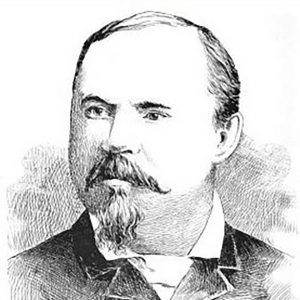calsfoundation@cals.org
William Joseph Hynes (1843–1915)
William Joseph Hynes was a Republican member of the U.S. House of Representatives. He was the at-large representative from Arkansas in the Forty-Third Congress, serving from 1873 to 1875.
William J. Hynes was born on March 31, 1843, in County Clare, Ireland. He was the son of Thomas Hynes and Catherine O’Shea Hynes. His father died in 1848, and Hynes’s mother brought the family to the United States five years later, settling first in Springfield, Massachusetts. It was in Massachusetts where Hynes received his early education, a program of study that included training in printing. He worked first in newspaper publishing but turned to law. He apprenticed in the office of a local Springfield attorney and then moved south, being first admitted to the bar in Nashville, Tennessee. In 1870, he was admitted to the Arkansas bar, opening a practice in Little Rock (Pulaski County). In September 1871, he married Jennie Way.
Ambitious and ready to take advantage of a chaotic Republican Party, Hynes aligned himself in 1872 with the group that supported newspaper publisher Horace Greeley for president. Hynes ran for Congress himself as a Liberal Republican, winning a hotly contested race in which he edged out the official Republican candidate, Joseph Bradley, by about 250 votes. Victory did not come without controversy, however, as after the election, Bradley charged that Hynes had reneged on a deal to “sell” the seat. However, subsequent investigations found no substance to the charges.
Although he was in Washington DC, where he served on both the Committee on Public Expenditures and the Committee on Territories, Hynes could not escape the turmoil that broke out in Arkansas in 1874: the Brooks-Baxter War. Hynes shepherded legislation through the House that authorized a committee to travel to the state to investigate the disputed gubernatorial election at the heart of the conflict. Amid shifting party loyalties and influence, Hynes was defeated for reelection in 1874 by William Wallace Wilshire, whose own initial victory in 1872 had been overturned.
Hynes moved to Chicago, Illinois, in 1876 and returned to the practice of law. His political and legal efforts had made him a nationally known Irish-American, and his efforts and accomplishments were reported and hailed in the active Irish press across the country. In Chicago, he handled a number of high-profile legal cases. Initially, he established a partnership with Judge Walter B. Scates, and he was later the senior partner in the firm of Hynes, English, and Dunne.
By the end of his time in Chicago, he had moved into a solo practice, from which he retired in 1910. Hynes moved to Los Angeles, California, where he lived until his death on April 2, 1915. He is interred in Calvary Cemetery in Los Angeles.
For additional information:
“Irish-American Talent.” Irish-American Weekly, May 31, 1873, p. 3.
Leonard, John W. The Book of Chicagoans: A Biographical Dictionary of Leading Living Men of the City of Chicago. Chicago: A. N. Marquis & Company, 1905.
“Sic Temper Tyrannis.” Morning Republican (Little Rock), May 28, 1874, p. 1.
Untitled article. Irish-American Weekly, May 31, 1873, p. 4.
William H. Pruden III
Ravenscroft School
 William J. Hynes
William J. Hynes 



Comments
No comments on this entry yet.